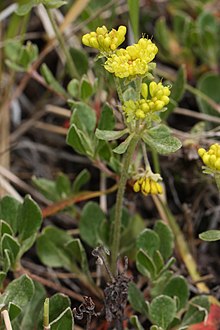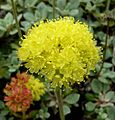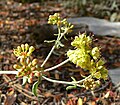| Eriogonum umbellatum | |
|---|---|

| |
| Eriogonum umbellatum var. hypoleium | |
|
Scientific classification
| |
| Kingdom: | Plantae |
| Clade: | Tracheophytes |
| Clade: | Angiosperms |
| Clade: | Eudicots |
| Order: | Caryophyllales |
| Family: | Polygonaceae |
| Genus: | Eriogonum |
| Species: | E. umbellatum
|
| Binomial name | |
| Eriogonum umbellatum | |
Eriogonum umbellatum is a species of wild buckwheat known by the common name sulphurflower buckwheat, or simply sulphur flower.
Description
It is an extremely variable plant and hard to identify because individuals can look very different from one another. Also, there are many varieties. It may be a perennial herb blooming by summer [1] with stems 10 centimetres (4 in) tall[ citation needed] and two to six clusters of flowers, with a whorl of leaves below the stems, [1] or a sprawling shrub approaching 2 metres (6+1⁄2 ft) high and wide.[ citation needed] The leaves are usually woolly and low on the plant, and the flowers come in many colors from white to bright yellow to purple.
Varieties
- E. u. var. argus - often nearly hairless leaves and bright yellow flowers; limited to the Klamath Mountains
- E. u. var. dichrocephalum - found throughout much of the western United States
- E. u. var. furcosum - a low shrub native to the Sierra Nevada
- E. u. var. glaberrimum - (green buckwheat) - a nearly hairless, white-flowered species
- E. u. var. humistratum - (Mt. Eddy buckwheat) - a rare northern California endemic
- E. u. var. juniporinum - (juniper buckwheat) - an uncommon plant of eastern California and western Nevada
- E. u. var. subalpinum - (sulfur buckwheat) - similar to Eriogonum eriogonum but has wider and more spoon-shaped leaves
- E. u. var. torreyanum - (Donner Pass buckwheat) - known from fewer than 10 occurrences near the Donner Pass
- E. u. var. versicolor - bears pinkish-brown flowers with bright stripes
Distribution and habitat
It is native to western North America from California to Colorado to central Canada, where it is abundant and found in many habitats, including the sagebrush steppe and alpine areas. [1]
Ecology
It is a popular larval host, feeding the bramble hairstreak, desert green hairstreak, lupine blue, Mormon metalmark, Rocky Mountain dotted blue, Sheridan's hairstreak, Sonoran metalmark, and western green hairstreak. [2] Additionally, goats and domestic sheep feed on the plant. [3]
Cultivation
The wildflower gardening author Claude A. Barr complemented sulphurflower buckwheat as a "treasure in appearance and in adaptation in my garden." [4] It is valued for its very low water usage for xeriscaping. The cultivar "Kannah Creek", a selection of Eriogonum umbellatum var. aureum, has been introduced to the garden trade by the Plant Select cooperative sponsored by Colorado State University and Denver Botanic Gardens. [5] [6] It grows in USDA zones 4–8. [7]
-
E. umbellatum var. dichrocephalum
-
E. umbellatum var. humistratum (habit)
-
E. umbellatum var. humistratum (flowers)
-
E. umbellatum var. hypoleium (habit, William O. Douglas Wilderness)
-
E. umbellatum var. hypoleium (flowers)
-
E. umbellatum var. majus (flowers, Wenatchee Mountains)
-
E. umbellatum var. subaridum (flowers, Spring Mountains)
References
- ^ a b c Taylor, Ronald J. (1994) [1992]. Sagebrush Country: A Wildflower Sanctuary (rev. ed.). Missoula, MT: Mountain Press Pub. Co. p. 30. ISBN 0-87842-280-3. OCLC 25708726.
- ^ The Xerces Society (2016), Gardening for Butterflies: How You Can Attract and Protect Beautiful, Beneficial Insects, Timber Press.
- ^ Reiner, Ralph E. (1969). Introducing the Flowering Beauty of Glacier National Park and the Majestic High Rockies. Glacier Park, Inc. p. 32.
- ^ Barr, Claude A. (1983). Jewels of the plains : wild flowers of the Great Plains grasslands and hills. Minneapolis: University of Minnesota Press. p. 77. ISBN 0-8166-1127-0.
- ^ "Kannah Creek Buckwheat". Colorado Springs Utilities Xeriscaping. Colorado Springs Utilities. Retrieved 27 May 2023.
- ^ "From Grand Mesa, It's Kannah Creek® Buckwheat!". Plant Select. 30 November 1999. Retrieved 27 May 2023.
- ^ "Eriogonum umbellatum". Plant Finder. Missouri Botanical Garden. Retrieved 27 May 2023.
External links
-
 Media related to
Eriogonum umbellatum at Wikimedia Commons
Media related to
Eriogonum umbellatum at Wikimedia Commons - Jepson Manual Treatment
- Ethnobotany
- Photo gallery
- NatureServe secure species
- Eriogonum
- Flora of the Northwestern United States
- Flora of the Southwestern United States
- Flora of Alberta
- Flora of British Columbia
- Flora of New Mexico
- Flora of the Cascade Range
- Flora of the Rocky Mountains
- Flora of the Sierra Nevada (United States)
- Flora of the California desert regions
- Natural history of the California chaparral and woodlands
- Natural history of the California Coast Ranges
- Natural history of the Mojave Desert
- Natural history of the Peninsular Ranges
- Natural history of the San Francisco Bay Area
- Natural history of the Transverse Ranges







